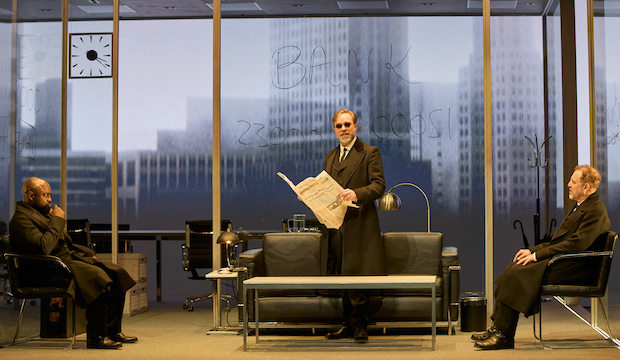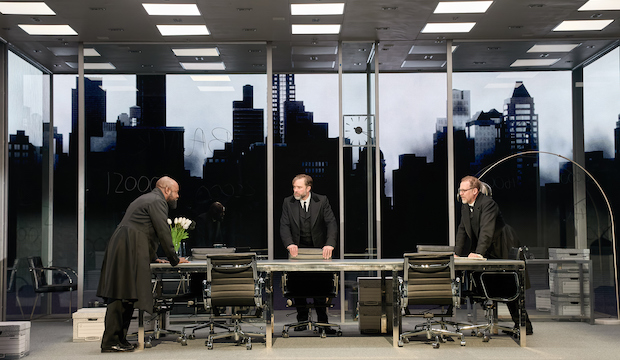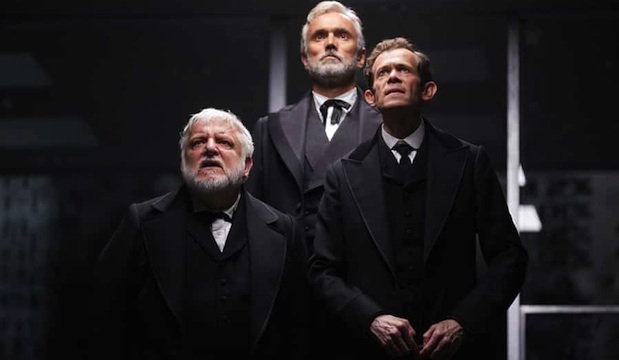The Lehman Trilogy, Gillian Lynne Theatre review ★★★★★
Sam Mendes’s production of the familial finance saga returns from Broadway and is performed with aplomb by Nigel Lindsay, Hadley Fraser and Michael Balogun
The Lehman Trilogy West End 2023. Hadley Fraser, Nigel Lindsay and Michael Balogun. Photo: Mark Douet
Back from Broadway, brandishing five shiny Tony Awards to trump its Olivier nominations (the American finance saga proving even more popular in its origin country), Sam Mendes’s production of The Lehman Trilogy has been reinstalled in the West End for a four-month run. Playing the Jewish brothers who left their home in Bavaria, Germany, in pursuit of the American Dream are three fresh faces: Nigel Lindsay (Victoria, Four Lions), Hadley Fraser (Les Misérables) and Michael Balogun (Death of England: Delroy), who master their main roles and a procession of minor parts with aplomb.
The epic story in three parts charts the one-in-a-billion rise and fall of what was, at its peak, America’s fourth largest investment bank. Spanning three generations and a run time of over three hours, it begins in the 1840s with the brothers arriving in America and launching a successful cotton business in Montgomery, Alabama. Brushing over slavery, we see their business survive the Civil War, join the coffee exchange, invest in the railways and firearms, and, with the Deep South left behind for New York City, establish itself as an investment company – one that even survives the Wall Street Crash of 1929.

The Lehman Trilogy West End 2023. Michael Balogun, Hadley Fraser and Nigel Lindsay. Photo: Mark Douet
We see two of the brothers become fathers teaching their lisping sons, then the sons advising their fathers as the world around them changes with the rise of advertising, consumerism and technology. We see the family’s Jewish traditions dwindle as capitalism becomes their unofficial god – one that doesn’t allow for weeks, or even days, spent mourning the dead.
It’s a tour-de-force performance from Lindsay, Fraser and Balogun, who age as the original brothers before being reborn as the next generation, and the next, also slipping into the skins of lovers, wives and business partners with seeming ease.
Had the story ended in 1929, it would have been a happy ending for the Lehman family and a one-up for capitalism, but instead it hurtles through the next century to the financial crash of 2008 – vivid in the memories of today’s audiences – which saw the eventual downfall of Lehman Brothers Holdings Inc.

The Lehman Trilogy West End 2023. Michael Balogun, Hadley Fraser and Nigel Lindsay. Photo: Mark Douet
Designer ES Devlin has the whole story play out from inside a stripped-back, glass-walled office. It spins on cue to carry us through the decades, while behind it, simple black and white projections take us from Alabama’s cotton fields to Manhattan’s skyscrapers then inside a number-crunching trading floor. To the right, a solitary piano played here by Yshani Perinpanayagam scores the entire show, mirroring and heightening its emotions. It’s slick and classy – like all Devlin designs.
There’s virtually no props, save for stacks of cardboard boxes, and nor are they missed when Ben Power’s adaptation of Stefano Massini’s five-hour original is made to feel so current. Told in the present tense, with the Lehmans speaking directly to us, it feels immediate and urgent, and is miraculously easy to follow as a history lesson in American economics.
Don’t be put off by the three-and-a-half-hour run time; Mendes’s production will keep you engaged throughout – and feels horribly relevant as we teeter on the edge of another financial disaster.
The Lehman Trilogy, National Theatre review, 2018 ★★★★★
Stefan Massini’s sprawling five-hour long play about the Lehman brothers and their now infamous corporation has been adapted and somewhat streamlined (only three or so hours long) by Ben Power. Spanning 1844 to the present day, Sam Mendes directs this American epic about dynasty, greed, and business. Although colossal, absorbing and at times poetic, The Lehman Trilogy makes an impact that still resonates, but is less profound than anticipated.
Massini’s original play starts in 1844 and continues until 1984, before the Lehman Brothers' bankruptcy in 2008. Yet in this powerhouse production, the catastrophic consequences of the investment bank’s fall act as bookends. The set is the corporation’s high-rise office in 2008, with banker's boxes on the floor, and remains so for the entire saga, rotating with a panoramic screen behind, indexing different times and places. Highly filmic and with piano accompaniment, Mendes allows history to wash over the almost vacant office, as if it were a magical music box.
Simon Russell Beale, Ben Miles and Adam Godley are fantastic as the brothers and their descendants. They speak in the third person, narrating their characters’ lives with almost no dialogue, using repetition effectively although sometimes overly to signify characters. The effect is not particularly theatrical, more like a novel, but the performances are phenomenal. Beale, in particular, is astounding, transforming from Henry to Mayer’s wife, to Emanuel’s son Philip to Pete Peterson, the first non-Lehman president of the business. While perhaps Miles is the least dexterous at changing characters, the ensemble are crucial to making the epic resonate and all create nuanced and complex characters.

Some aspects of the story are cast over. When Henry (Beale), Emanuel (Miles) and Mayer (Godley) Lehman immigrate to America, their dream of a better life is seemingly celebrated in Power’s script, even as they expand in Montgomery, Alabama due to the cotton empire. There are mentions of slavery and the Ku Klux Klan, but the tools of oppression that allow the Lehmans' success are left peripheral, never explicitly named as enabling their prosperity.
That said, as they grow their business from a clothes shop to a broker company, to a bank and then to a corporation, ominous nightmares about trains, weighty burdens, and the tower of Babel consume the family. There’s a correlation between the rise of their empire and the loss of their faith. The week-long Jewish mourning ritual, shiva, takes days for Henry, but for the family’s descendants takes mere minutes (or no time at all). With a powerful climax of the 1929 stock-market crash that foreshadows the company’s fatal destiny, there is a real sense of loss, that something has gone astray.
But whether it be the American dream, connections to their homeland, or family identity, exactly what is lost is left unsaid, and deflates what could be a truly profound ending. Nevertheless, The Lehman Trilogy is still excellent storytelling, and is certainly a strong addition to the National’s programme this year.
The epic story in three parts charts the one-in-a-billion rise and fall of what was, at its peak, America’s fourth largest investment bank. Spanning three generations and a run time of over three hours, it begins in the 1840s with the brothers arriving in America and launching a successful cotton business in Montgomery, Alabama. Brushing over slavery, we see their business survive the Civil War, join the coffee exchange, invest in the railways and firearms, and, with the Deep South left behind for New York City, establish itself as an investment company – one that even survives the Wall Street Crash of 1929.

The Lehman Trilogy West End 2023. Michael Balogun, Hadley Fraser and Nigel Lindsay. Photo: Mark Douet
We see two of the brothers become fathers teaching their lisping sons, then the sons advising their fathers as the world around them changes with the rise of advertising, consumerism and technology. We see the family’s Jewish traditions dwindle as capitalism becomes their unofficial god – one that doesn’t allow for weeks, or even days, spent mourning the dead.
It’s a tour-de-force performance from Lindsay, Fraser and Balogun, who age as the original brothers before being reborn as the next generation, and the next, also slipping into the skins of lovers, wives and business partners with seeming ease.
Had the story ended in 1929, it would have been a happy ending for the Lehman family and a one-up for capitalism, but instead it hurtles through the next century to the financial crash of 2008 – vivid in the memories of today’s audiences – which saw the eventual downfall of Lehman Brothers Holdings Inc.

The Lehman Trilogy West End 2023. Michael Balogun, Hadley Fraser and Nigel Lindsay. Photo: Mark Douet
Designer ES Devlin has the whole story play out from inside a stripped-back, glass-walled office. It spins on cue to carry us through the decades, while behind it, simple black and white projections take us from Alabama’s cotton fields to Manhattan’s skyscrapers then inside a number-crunching trading floor. To the right, a solitary piano played here by Yshani Perinpanayagam scores the entire show, mirroring and heightening its emotions. It’s slick and classy – like all Devlin designs.
There’s virtually no props, save for stacks of cardboard boxes, and nor are they missed when Ben Power’s adaptation of Stefano Massini’s five-hour original is made to feel so current. Told in the present tense, with the Lehmans speaking directly to us, it feels immediate and urgent, and is miraculously easy to follow as a history lesson in American economics.
Don’t be put off by the three-and-a-half-hour run time; Mendes’s production will keep you engaged throughout – and feels horribly relevant as we teeter on the edge of another financial disaster.
The Lehman Trilogy, National Theatre review, 2018 ★★★★★
Stefan Massini’s sprawling five-hour long play about the Lehman brothers and their now infamous corporation has been adapted and somewhat streamlined (only three or so hours long) by Ben Power. Spanning 1844 to the present day, Sam Mendes directs this American epic about dynasty, greed, and business. Although colossal, absorbing and at times poetic, The Lehman Trilogy makes an impact that still resonates, but is less profound than anticipated.
Massini’s original play starts in 1844 and continues until 1984, before the Lehman Brothers' bankruptcy in 2008. Yet in this powerhouse production, the catastrophic consequences of the investment bank’s fall act as bookends. The set is the corporation’s high-rise office in 2008, with banker's boxes on the floor, and remains so for the entire saga, rotating with a panoramic screen behind, indexing different times and places. Highly filmic and with piano accompaniment, Mendes allows history to wash over the almost vacant office, as if it were a magical music box.
Simon Russell Beale, Ben Miles and Adam Godley are fantastic as the brothers and their descendants. They speak in the third person, narrating their characters’ lives with almost no dialogue, using repetition effectively although sometimes overly to signify characters. The effect is not particularly theatrical, more like a novel, but the performances are phenomenal. Beale, in particular, is astounding, transforming from Henry to Mayer’s wife, to Emanuel’s son Philip to Pete Peterson, the first non-Lehman president of the business. While perhaps Miles is the least dexterous at changing characters, the ensemble are crucial to making the epic resonate and all create nuanced and complex characters.

Some aspects of the story are cast over. When Henry (Beale), Emanuel (Miles) and Mayer (Godley) Lehman immigrate to America, their dream of a better life is seemingly celebrated in Power’s script, even as they expand in Montgomery, Alabama due to the cotton empire. There are mentions of slavery and the Ku Klux Klan, but the tools of oppression that allow the Lehmans' success are left peripheral, never explicitly named as enabling their prosperity.
That said, as they grow their business from a clothes shop to a broker company, to a bank and then to a corporation, ominous nightmares about trains, weighty burdens, and the tower of Babel consume the family. There’s a correlation between the rise of their empire and the loss of their faith. The week-long Jewish mourning ritual, shiva, takes days for Henry, but for the family’s descendants takes mere minutes (or no time at all). With a powerful climax of the 1929 stock-market crash that foreshadows the company’s fatal destiny, there is a real sense of loss, that something has gone astray.
But whether it be the American dream, connections to their homeland, or family identity, exactly what is lost is left unsaid, and deflates what could be a truly profound ending. Nevertheless, The Lehman Trilogy is still excellent storytelling, and is certainly a strong addition to the National’s programme this year.
TRY CULTURE WHISPER
Receive free tickets & insider tips to unlock the best of London — direct to your inbox
| What | The Lehman Trilogy, Gillian Lynne Theatre review |
| Where | The Gillian Lynne Theatre, 166 Drury Lane, London, WC2B 5PW | MAP |
| Nearest tube | Holborn (underground) |
| When |
24 Jan 23 – 20 May 23, 7:00 PM – 10:00 PM |
| Price | £24+ |
| Website | Click here for more information |